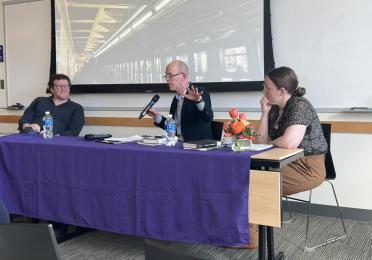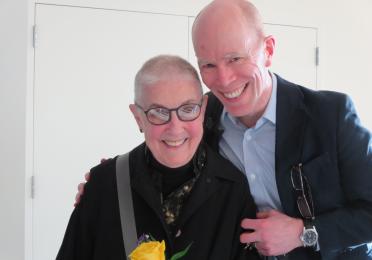
On Wednesday, April 2nd, the UW English Department had the honor of hosting celebrated poet and theologian Pádraig Ó Tuama for a public lecture as part of the 8th Annual Lee Scheingold Lecture in Poetry and Poetics.
After an introduction by Professor Charles LaPorte, who cited Ó Tuama’s exceptional ability to uncover new dimensions to familiar poems through his podcast Poetry Unbound, the audience was treated to a masterclass in engaging, thoughtful, and fundamentally humanistic poetic inquiry.
Ó Tuama’s lecture, “You: The Lyric Address in Poetry,” poked and prodded at the deceptively complex topic of the addressed “you” in poetry. He seamlessly wove together occurrences of subway ads (“Not feeling yourself?”), neighborly invocations (“Is that you?”), text messages (“You free for a call?”), and astute analyses of poems across the centuries that invite, involve, or implicate the reader through the second-person address “you.”
Watching Ó Tuama speak on “the electricity of what art can do with this simple pronoun,” and to do so with such clarity and tenderness, was one of the true gifts that the 2024-25 academic year has offered this particular reviewer.
Among other recurring motifs, Ó Tuama worked around the idea that poetry does not exist to do the difficult work of being in relation with the world (see: “poetry will save us”), but rather that we are there to do the work in response to and in an engagement with poetry. He read Iraqi-American Dunya Mikhail’s poem “My Poem Will Not Save You” precisely to illustrate this point. Mikhail’s imagery of the ruins left behind by war is punctuated at its climax with the lines “I am sorry / my poem will not save you.” Likewise, Lorna Goodison’s “This is a Hymn” points a condemnatory finger at the “you” who walks by suffering: "This is a hymn / for all recommending / a bootstrap as a way / to rise with effort / on your part. This is a hymn / may it renew what passes for your heart.” Electrified by such provocations from Ó Tuama, murmurs denoting impact rippled through the crowd.
Beyond Mikhail and Goodison, O Tuama drew from Nicole Sealey’s “Object Permanence,” Paul Celan’s “Psalm,” Rilke’s “To Lou Andreas-Salome,” Claudia Rankine and Beth Loffreda’s “On Whiteness and the Racial Imaginary,” and his own poetry in a recently-published collection, Kitchen Hymns.
Following the reading, attendees were treated to an exceptional Q&A. PhD student Molly Porter opened the session by reflecting on the motif of questions that pervades Ó Tuama’s work, asking, “what makes a good question for you?” Replied our guest: a good question “knows that it is exploring something it does not know.” And the questions that followed, almost exclusively from our fine UW students, would thus qualify as excellent questions. Ó Tuama demonstrated true care in responding to students, and this reviewer took much from this example of public pedagogy to use in his own classroom with invariably less success than Ó Tuama.

For all of this, we have Lee Scheingold to thank. Lee's dedication to the twin pursuits of “words, and loving people” has been readily apparent since she shared these words at the first inaugural Lecture in 2018. Her commitment to providing space for poetry and poetics within the broader UW community reflects the words of English Department Chair Habiba Ibrahim, who opened the event with the invocation that:
poetry has a remarkably transformative power that belongs to the world. It belongs to everyday life. It belongs to the way that we live as we go about the quotidian aspects of our days. It’s not something that belongs in an ivory tower. It’s not something that belongs in a collection of books that only a few can reach. It’s not something that belongs in the hands of an elite. It’s something that belongs to all of us. And I have so much appreciation for Lee Scheingold for making occasion every year for us to luxuriate in that fact, remember it, to appreciate that poetry belongs to us.
We are no doubt richer for being able to gather annually for the Lee Scheingold Lecture in Poetry and Poetics. Thanks to Lee, to Padraig, to Habiba and Charles and Molly, to Karen Wennerstrom and Rhema Hokama for the photos, to front office administrator Karla Tofte for the coordination, and to all who attended!